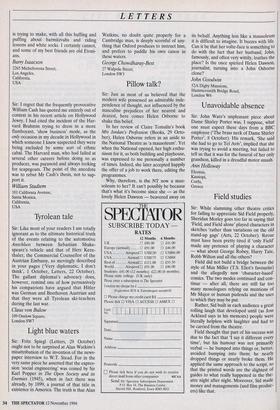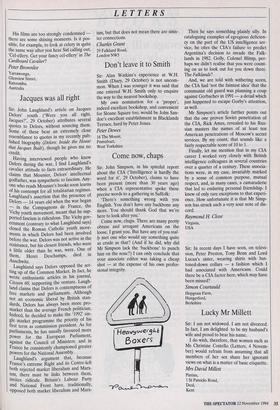Field studies
Sir: While slamming other theatre critics for failing to appreciate Sid Field properly, Sheridan Morley goes too far in saying that `Field, and Field alone' played characters in sketches 'rather than variations on the old stand-up gags' (Arts, 22 October). Revue must have been pretty tired if 'only Field' made any pretence of playing a character — what about George Robey, Harry Tate, Robb Wilton and all the others?
Field did not build a bridge between the style of Max Miller (T.S. Eliot's favourite) and the allegedly new 'character-based' comics. The two modes continued and con- tinue — after all, there are still far too many monologues relying on mentions of Mr Major or human pudenda and the uses to which they may be put.
Rather, Sid built in each audience a great rolling laugh that developed until (as Joss Ackland says in his memoirs) people were literally helpless with laughter and had to be carried from the theatre.
Field thought that part of his success was due to the fact that 'I say it different every time', but his humour was not primarily verbal — he bumped into things or, better, avoided bumping into them; he nearly dropped things or nearly broke them. He applied the same approach to the script, so that the printed words are the slightest of guides to what really happened in the the- atre night after night. Moreover, Sid made money and managements (and film produc- ers) like that.
LETTERS
His films are too strongly condemned there are some shining moments. Is it pos- sible, for example, to look at celery in quite the same way after you hear Sid calling out, `Cel-ellery. Get your fancy cel-ellery' in The Cardboard Cavalier?
Peter Brownlee
Yarrawonga, Glenview Street, Katoomba, Australia



































































 Previous page
Previous page